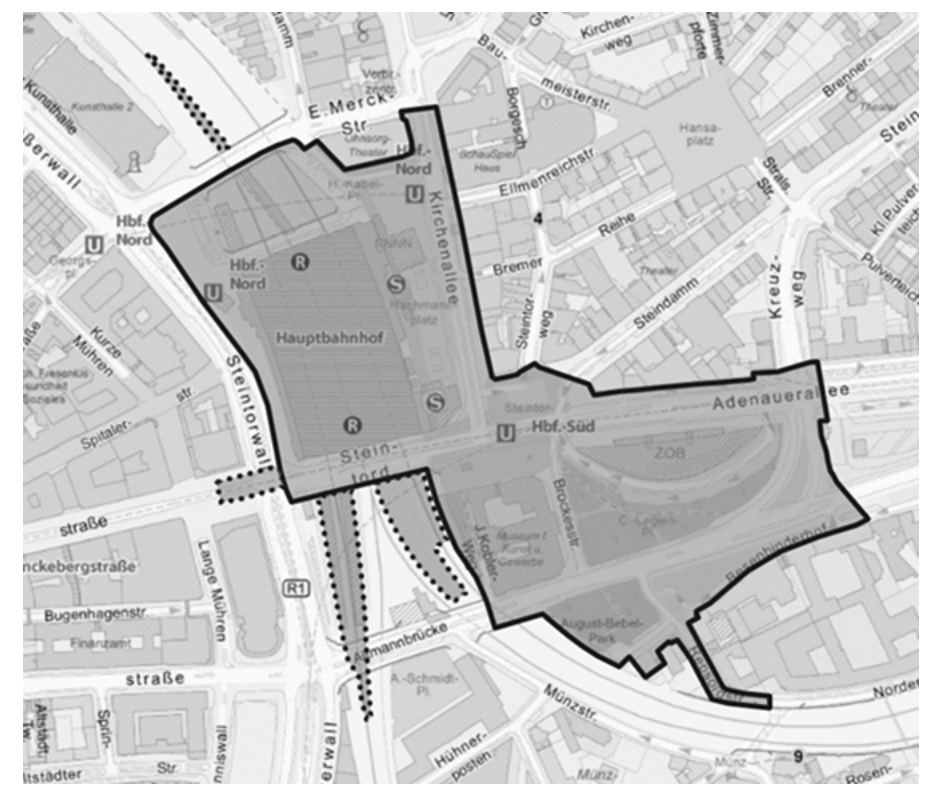Hauptbahnhof increases presence of “Quattro patrols”.
The Hamburg Senate is implementing the package of measures for more security at the main railway station step by step. In order to be able to take even more consistent action against people carrying knives and other dangerous objects, the Senate decided this week to set up a permanent no-weapons zone at the main railway station from 1 October.
The details of the new regulation were presented on Friday by Senator of the Interior Andy Grote, Police Commissioner Ralf Martin Meyer and the head of the Hamburg Federal Police Inspectorate, Police Senior Councillor Jan Müller. Accordingly, the weapons ban will apply in the future at the main railway station including all public railway facilities, the underground connections including the Mönckeberg tunnel, as well as at Heidi Kabel Square, Hachmann Square, the ZOB and August-Bebel Park (see attachment). In addition to firearms and similar objects, the weapons ban also includes knives with a blade length of more than four centimetres as well as brass knuckles or so-called “manslayers”. The corresponding signs have already been put up this week.
The ban on carrying weapons and knives in the designated public areas is intended to enable continuous checks and joint focal point operations by the Hamburg police and the federal police. Violations of the weapons ban are subject to a fine of at least 200 euros. Security personnel, but also craftsmen and employees in the commercial transport of money and valuables are exempt. Exceptions also apply to catering establishments, scout groups and residents who carry knives in locked containers or packaging.
Weapons ban zones have already been in place for years in the Reeperbahn area and at Hansaplatz. Against the background of the positive experience with these weapons bans and the recent temporary weapons bans in the main railway station imposed by general orders of the Federal Police, the establishment of a permanent weapons ban zone is considered a sensible measure to improve the security situation around the main railway station. As a consequence of the Brokstedt crime, Hamburg recently advocated at the level of the Conference of Interior Ministers for nationwide, uniform regulations on weapons bans in trains and at railway stations.
In addition, video surveillance in the area of Hamburg’s main railway station is to be expanded. The first construction measures for the planned ten locations are to begin in the first quarter of 2024. At the same time, the interior authorities are preparing a ban on alcohol consumption in the public areas of Hachmannplatz and Heidi-Kabel-Platz, which is to come into force from spring next year. The background to the measure is a large number of offences committed under the influence of alcohol.
Boundary of the weapons ban area
As Germany’s busiest railway station, Hamburg’s main railway station and its immediate surroundings continue to be a clear focus of the security authorities. In relation to the more than 500,000 people who travel through Hamburg’s main station every day, the risk of becoming a victim of a violent crime here is significantly lower than at other German railway stations, but nevertheless an increase in crime was also noticeable here with the end of the pandemic-related restrictions in the second half of 2022. Since autumn last year, measures to protect public safety and order have been intensified at various levels, including a continuous increase in police presence.
Within the framework of the “Alliance for a Safer Central Station”, employees of the Hamburg Police, the Federal Police, DB Security and the Hochbahnwache have been on the move around the Central Station since spring with increased effectiveness. At the centre of the agreed cooperation is the implementation of joint patrols (so-called “Quattro patrols”), the presence of which has recently been increased again at weekends and at particularly busy times. The “Quattro patrols” are perceived extremely positively by passengers, but also by traders and restaurateurs, and contribute to a stronger sense of security. Since the beginning of the measures, almost 5,300 people have been checked during the joint patrols alone and more than 430 criminal charges have been filed. In more than 1,200 cases, domiciliary rights were enforced.
The high presence of the security forces at the main station is already having an effect. In the course of the increased controls, more offences and crimes are being discovered that would otherwise remain undetected. While the proportion of so-called control offences (such as offences against the Narcotics Act, offences against the Residence Act as well as trespassing and fraudulent services) has increased significantly and accounts for about two thirds of the total crime at the main station, the number of offences remains at an increased level compared to previous years. In individual offence areas, such as bodily harm, the first decreases can be noted.





